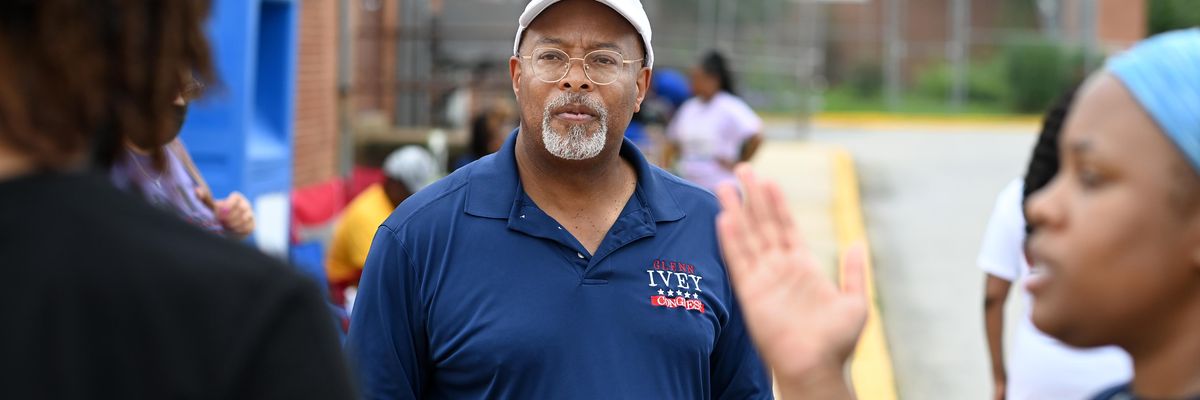Glenn Ivey, a corporate attorney and former top prosecutor in Prince George's County, defeated his progressive opponent, former U.S. Rep. Donna Edwards, in the Democratic primary for Maryland's 4th Congressional District thanks in large part to the millions of dollars that pro-Israel lobby groups invested to help him in Tuesday's race.
The United Democracy Project (UDP)--a super PAC launched in December by the American Israel Public Affairs Committee (AIPAC) as a way to legally shell out unlimited sums of money to directly influence elections and counter mounting criticism of Israeli apartheid from within the Democratic Party--spent almost $6 million to oppose Edwards, who served in the House for eight years as a member of the Congressional Progressive Caucus before losing her 2016 Senate bid.
It was just the latest example of how a right-wing organization funded to a significant extent by billionaire Republicans is increasingly distorting Democratic primaries. Rep. Andy Levin (D-Mich.), another progressive defender of Palestinian rights and a pro-working class agenda, also finds himself in the UDP's crosshairs ahead of his fast-approaching showdown against Rep. Haley Stevens (D-Mich.).
Although Edwards was endorsed by House Speaker Nancy Pelosi (D-Calif.) and other high-ranking Democrats, "she angered some pro-Israel groups during her stint as a representative by failing to back resolutions in support of Israel over its 2011 war in Gaza and other positions," The Guardian reported Tuesday. "She also backed the Obama administration's nuclear deal with Iran when it was strongly opposed by the Israeli government and therefore AIPAC."
"UDP-funded television ads criticizing Edwards make no mention of Israel and instead attack her as an ineffective politician who got nothing done during her stint in Congress," the newspaper noted.
As Democracy Now! summarized its Tuesday conversation with Peter Beinart, the editor-at-large of Jewish Currents, conservative pro-Israel groups intentionally "disguise their attack ads with local issues but in reality are designed to oust candidates who take stances in support of Palestinian rights and working people."
Democratic Majority for Israel (DMFI), another pro-Israel lobby group, spent nearly $430,000 to boost Ivey, and over half of Ivey's more than $1 million in fundraising contributions came from AIPAC donors.
Despite leading polls by 13 points in May, Edwards lost an enormous amount of ground over the past two months. With just over two-thirds of ballots counted, she has received approximately 8,000 fewer votes than Ivey, losing by a margin of 51.2% to 35.2%.
J Street, a more liberal pro-Israel group that has criticized Washington's unconditional support for the Israeli government and wants the U.S. to take steps to end the occupation of Palestinian territory, supported Edwards with roughly $730,000 worth of ads through its super PAC.
Logan Bayroff, a spokesperson for J Street, accused AIPAC of being in cahoots with the GOP, citing its endorsement of congressional Republicans who voted to overturn President Joe Biden's electoral victory shortly after the January 6 insurrection at the Capitol.
"It's alarming that a group that has endorsed some of the most right-wing extremist Republicans, with a super PAC funded in part by Republican billionaire megadonors, could go into a Democratic primary and spend and spend with the single-minded purpose of crushing a fairly popular mainstream candidate who they've labelled anti-Israel with no evidence, no real justification at all, for such a claim," Bayroff told The Guardian.
"This is all about trying to drive the party back into [a] more rightward direction on Israel and foreign policy," he continued. "It's really alarming and it's fundamentally anti-democratic when a group can influence this process in such a way because most voters wouldn't know where this money is coming from. I think that's dangerous."
AIPAC has not been shy about what journalist David Dayen called its "perversion of the primary process," boasting Wednesday that it has helped topple nearly 10 progressive Democrats in recent months.
According to Bayroff, AIPAC and UDP are trying to intimidate candidates into "feeling that they cannot offer good faith criticism of Israeli policy, that they cannot vocally support Palestinian rights."
"They recognize that the political space on these issues in the Democratic Party has opened up," he added. "They want to try to arrest and reverse that trend and push us back to a place in which there's really very little public debate or discussion about the correct American role in the region."
As The American Prospect's Alexander Sammon wrote last week:
AIPAC's role in Democratic elections has changed drastically in just a handful of months. For many years, the group claimed to be a bipartisan entity, and didn't officially endorse candidates. Until this election cycle, the group didn't even have a super PAC; now, it's on pace to spend nearly $20 million in the 2022 Democratic primary cycle alone, making it by far the most influential individual political group in Democratic electoral politics.
[...]
For House Democratic leadership, the prospect of more "moderates" (if not crypto-Republicans) might be welcomed. They have long quarreled with progressives, and leapt at opportunities to blame the left flank for the party's woes. Those impulses, compounded by Democrats' inability to pass campaign finance reform as part of their doomed democracy reform package, have created a huge opportunity for Republicans to commandeer the party's own democratic process, one that they are seizing more and more with each passing primary.
But it's ultimately toxic for the party leadership to tacitly welcome a group currently endorsing a Republican who compared Democrats to Nazis. If Pelosi and company do nothing to combat right-wing entryism in their own party primary process, even as Republican funders target mainstream Democrats with close personal ties to the party's elite, AIPAC will only be emboldened further.
"Until leaders in the Democratic Party stand up and say this is unacceptable to take this money or any money like this, or until election laws are changed, the opportunity is there for a group like AIPAC to do this," Bayroff told the outlet. "We don't know where it ends. I wouldn't be surprised to find other Republican-aligned groups deciding to play in Democratic primaries going forward."




